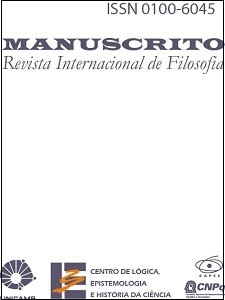Resumo
Demarcation of nature from culture is based on the dialogical polarity of first and second person constitutive of human beings. By means of the ancient categories of doing (I-role, i.e., Self) and suffering (You-role, i.e., Other) it is possible to capture conceptually the process of self-education as comprising both individuation and socialization on the level of non-verbal activity (man as a social animal) as well as on the level of verbal activity (man as a rational animal). As a consequence, the clash between the two theories of the cultural process that govern our intellectual history – is it a process of progress or one of decline? – which is exhibited as the background feeding especially the present day controversy between communitarianism (being a version of romantic individualism) and liberalism (being a version of enlightened universalism) will be resolved.Referências
ARENDT, H. (1958). The Human Condition (Chicago, University of Chicago Press).
BROCKER, M. & NAU, H.H. (eds.) (1997). Ethnozentrismus: Möglichkeiten und Grenzen des interkulturellen Dialogs (Darmstadt, Primus).
HERDER, J.G. [1784/1785] Ideen zur Philosophie der Geschichte der Menschheit.
————. [1772] Abhandlung über den Ursprung der Sprache.
————. [1799] Verstand und Erfahrung, Vernunft und Sprache. Eine Metakritik der reinen Vernunft.
HÖFFE, O. (1987). Politische Gerechtigkeit: Grundlegung einer kritischen Philosophie von Recht und Staat (Frankfurt a.M., Suhrkamp).
HUNTINGDON, S.P. (1966). The Clash of Civilizations (New York, Simon & Schuster).
LORENZ, K. (1992). Einführung in die Philosophische Anthropologie 2nd edn. (Darmstadt, BG).
————. (1995). Artikulation und Prädikation, in M. Dascal, D.
Gerhadus, K. Lorenz & G. Meggle (eds.) Sprachphilosophie/ Philosophy of Language/Philosphie du Langage: Ein Internationales Handbuch zeitgenösssicher Forschung/An International Handbook of Contemporary Research/Manuel des Recherches Contemporaines, 2 vols. (Berlin/ New York, De Gruyter).
————. (1997). Rede zwischen Aktion und Kognition, in A Burri (ed.) Sprache und Denken/Language and Thought (Berlin, De Gruyter).
————. (2000). Sinnbestimmung und Geltungssicherung, Ein Beitrag zur Sprachlogik, in G.-L. Lueken (ed.) Formen der Argumentation (Leipzig).
————. (2001). Dynamis und Energeia. Zur Aktualität eines begrifflichen Werkzeugs von Aristoteles, in T. Buchheim, C.H.
Kneepknes & K. Lorenz (eds.) Potentialität und Possibilität: Modalaussagebn in der Geschichte der Metaphysik (Stuttgardt, BadCannstatt).
————. (to appear). Pragmatics and Semiotic Prerequisites for Predication: A Dialogue Model.
LORENZER, A. (1974). Die Wahrheit der psychoanalytischen Erkenntnis. Ein historisch-materialistischer Einwurf (Frankfurt a M., Suhrkamp).
LYOTARD, J.-F. (1983). Le Différend (Paris, Editions de Minuit). MACINTYRE, A. (1983). After Virtue: A Study in Moral Theory, 2nd edn. (London, Duckworth).
MATURANA, H.R. & VARELA, F.J. (1979). Autopoeisis and Cognition.
The Realization of the Living. Boston Studies in the Philosophy of Science 42 (Dordrecht, Reidel).
PLATO, Politikos [The Statesman].
————. Protagoras.
RAO, N. (1999). Culture as Learnables: An Outline for a Research on the Inherited Traditions (Saarbrücken).
STEINMANN, H. & SCHERER, A. (eds.) (1998). Zwischen Universalismus und Relativismus (Frankfurt a M., Suhrkamp).
WOLTERS, G. (1988). Evolutionäre Epistemologie: eine Polemik, Vierteljahrschrift der Naturforschenden in Zürich, 133, 125-142.

